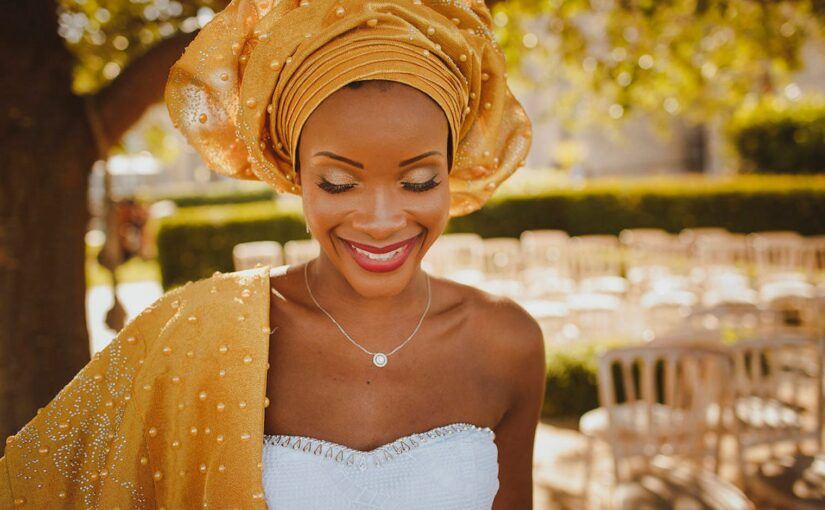Weddings are full to the brim with traditions and customs that couples may choose to include in their special day to celebrate their love and commitment to each other. In the UK, traditions include the couple not seeing each other the morning of the wedding, the bride wearing white and the couple cutting the wedding cake together.
But, many black communities have introduced new traditions to UK weddings, which many love to include in their wedding as a mark of respect and honour and to honour their heritage. Including traditions is a wonderful way to add depth and meaning to a wedding while keeping parts of a family’s culture alive.
In this post, and to celebrate Black History Month, we’re going to explore black wedding traditions and what you can do to honour your heritage at your wedding, including some from the Caribbean and several African countries, such as Nigeria, Ghana and Uganda.
Should you honour traditions at your wedding?
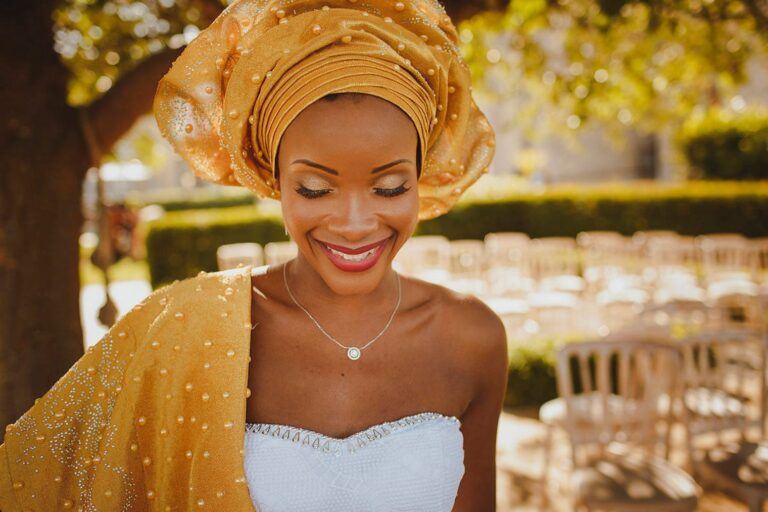
Weddings are all about celebrating the love between you and your spouse-to-be as you start this wonderful new chapter in your lives. As part of this, using traditions can be a touching and thoughtful way not only to mark your family’s history, but also to instil your personality and culture into your big day.
If you and your partner are from different backgrounds, honouring traditions is also a great way to bring two cultures together and pay tribute to your families.
That being said, whatever you choose to do for your wedding is entirely up to you – it’s your day, after all. You may choose to ignore traditions, or you may wish to include as many traditions related to your heritage as you can. And let’s be honest, our families love a good tradition, so it would definitely be appreciated.
How can you honour your heritage at your wedding?
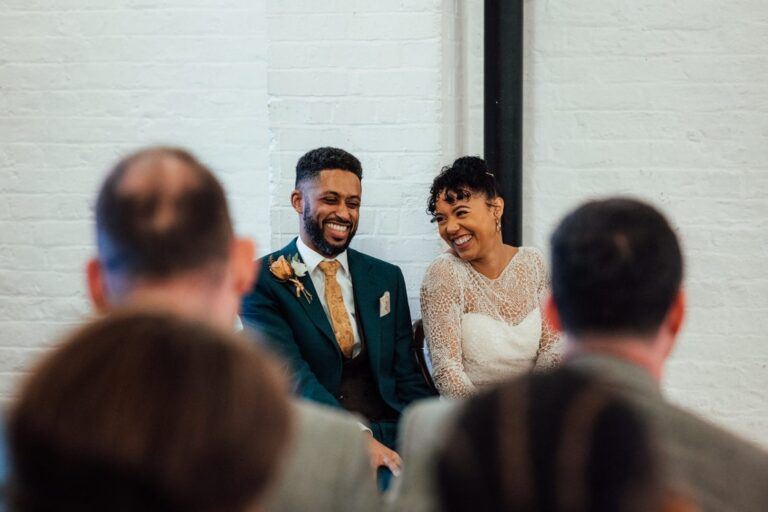
There are many ways you can honour your heritage at your wedding, which can be as big or small as your style, preferences and budget allow. Just some of the ways you can honour your heritage can be done through the:
- Ceremony
- Rituals
- Vows
- Venue
- Attire
- Food and drink
- Wedding favours
- Music
You might decide to go all-out and have a wedding heavily influenced by traditions and culture. Or, you might choose to honour your heritage in a few smaller ways.
60 black wedding traditions and how you can honour them
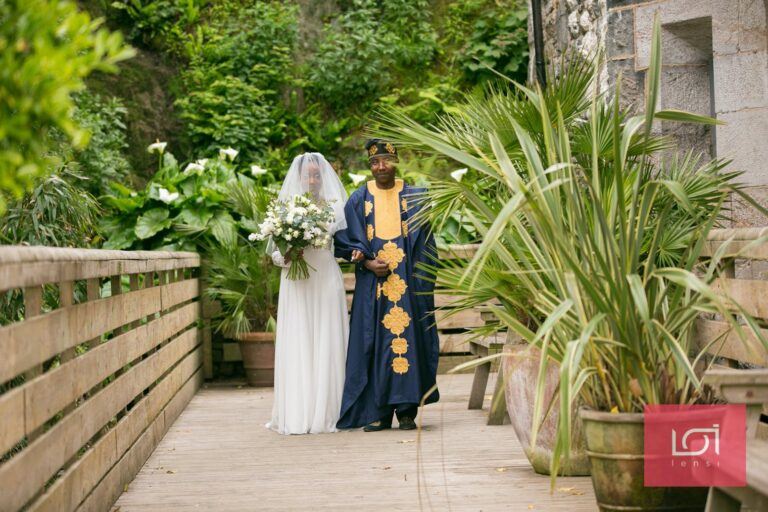
It might be important to you that your heritage influences your wedding day, but what traditions are there and which should you choose? Below are 60 black wedding traditions from around the world that make for wonderful ways to mark your family’s history and culture.
12 Caribbean wedding traditions
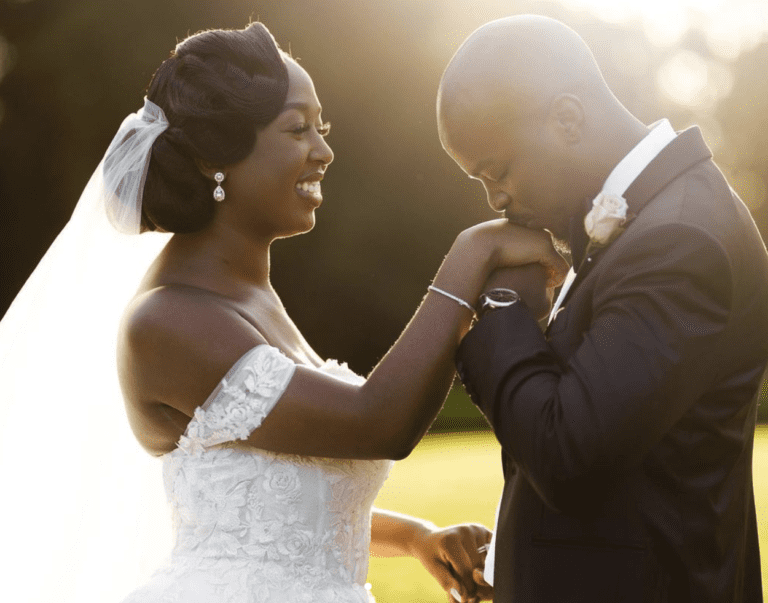
- Place a dime in the bride’s shoe to bring a life filled with wealth and prosperity.
- The bride is given away by both her mother and father.
- The Sunday after the ceremony and reception, the wedding guests are invited to the bride’s home after church, which is known as Tun T’anks Sunday.
- To symbolise purity and modesty, and in some cases hide from unpleasant spirits, the bride wears a veil until the end of the ceremony.
- Instead of throwing the bouquet over her head, the bride throws it straight at one of her dearest family members or friends. Some believe that if no one catches it and the bouquet lands on the floor, it’ll lead to infidelity.
- Wedding ceremonies are often held in a marquee in the back garden (though in the UK, not many of us have gardens that are nearly big enough).
- To honour family members they’ve lost and ensure they can take part in the celebrations, white rum is poured outside before the ceremony.
- If they hope to start a family, a slice of wedding cake is kept under the pillow, which is thought to help with fertility.
- Brides ask their bridesmaids to also dress in white, which is thought to confuse any evil spirits who might try to meddle with the big day.
- Instead of tin cans, shoes are tied to the back of the wedding car at the end of the night, which symbolises that the father of the bride is no longer financially responsible for her.
- Traditional Caribbean wedding cake is known as ‘black rum cake’, which takes six months to make as the fruit is soaked in rum.
- Traditional Caribbean wedding food and drink include:
- Curried goat
- Rice and peas
- Jerk chicken
- Jerk pork
- Fried plantain
- Cornmeal
- Pastries
- Potatoes
- Fruit
- Desserts
- Champagne
- Rum
12 Ghanaian wedding traditions
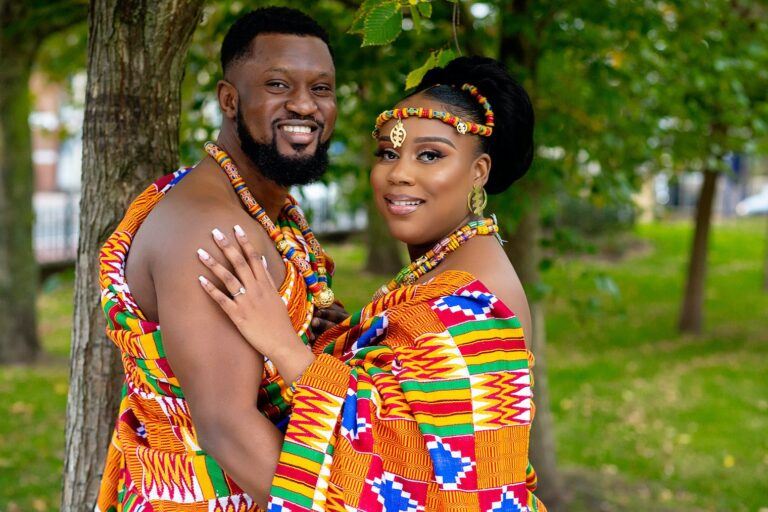
- Before the wedding there is a knocking ceremony, when the groom’s family approaches the bride’s family to tell them their son intends to marry their daughter.
- The bride’s brothers are offered money as a gesture of appreciation for protecting her, known as Akonta Sekan.
- The groom offers a drink, known as Tiri Nsa, to the bride’s father, which is often wine or schnapps, which acts as a dowry.
- The groom offers the bride’s family gifts known as ‘Aye-do-dee’, which can include meat, tobacco, schnapps and yams.
- Wedding attire is made from kente cloth (handwoven cotton and silk) which is brightly coloured with gold and jewels. This helps the couple feel like royalty for the day.
- Colours play an important role and represent different things:
- Pink represents calm
- Gold represents wealth
- Maroon wards off spirits
- Blue represents peace
- Traditionally, the wedding ceremony will take place at the bride’s home.
- Music from ‘Adowa’ groups will usually be played before the ceremony.
- As the guests take their seats before the ceremony, the bride’s family are usually seated first so they can welcome the groom’s family, who offer gifts.
- The bride gives consent three times to show that she is truly happy to become her fiance’s wife.
- During the first dance, guests are invited to throw money at the couple at the end of the song to help them start their new life together.
- Traditional Ghanaian wedding food and drinks include:
- Jollof rice
- Grilled fish
- Stew
- Roasted goat
- Fried plantains
- Plantain cakes
- Bofrot (spiced doughnuts)
10 Nigerian wedding traditions
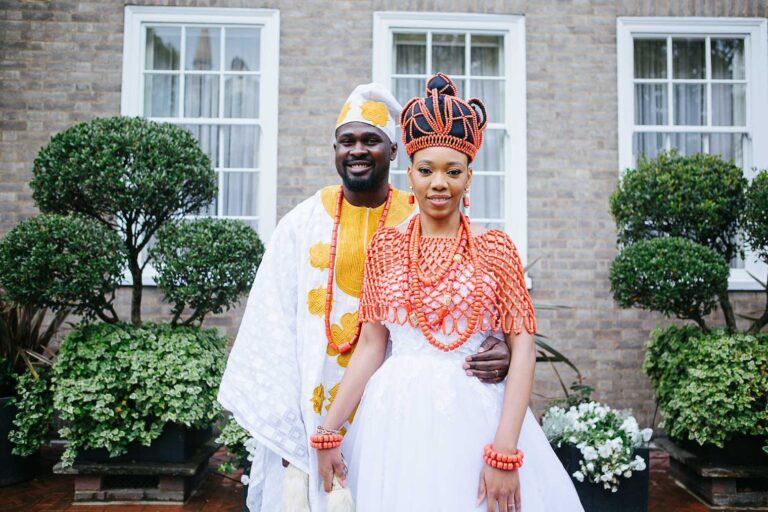
- One partner writes a letter to their intended fiance’s family asking for permission to marry their child, which is often read aloud.
- Traditionally, guest lists aren’t put together, as everyone from the community is welcome to attend.
- Before the wedding, the bride’s family gives the groom’s family a dowry list, which they must adhere to if they want the wedding to go ahead.
- Kola nuts that have been blessed are broken apart and are used as a way to welcome the guests – the more parts the nut breaks into, the more luck the couple will have.
- One colour is chosen for the bride and another for the groom, and each family is asked to wear clothing of that colour depending on whether they know the bride or groom.
- Weddings are traditionally officiated by an Alaga, who heckles the groom and his groomsmen as a form of wedding entertainment.
- Brides wear a headpiece known as a Gele and grooms wear a Fila, with both usually being custom-made.
- The groom and sometimes the groomsmen will lie face down on the floor at the feet of the bride’s family to show that he will respect his future wife.
- The cake is usually cut during the ceremony itself, rather than at the evening reception.
- Traditional Nigerian wedding food and drinks include:
- Jollof rice
- Fried rice
- Pepper soup
- Pounded yams
- Small chops
- Chicken curry
- Porridge
- Ofada sauce
- Moin moin
10 Ugandan wedding traditions
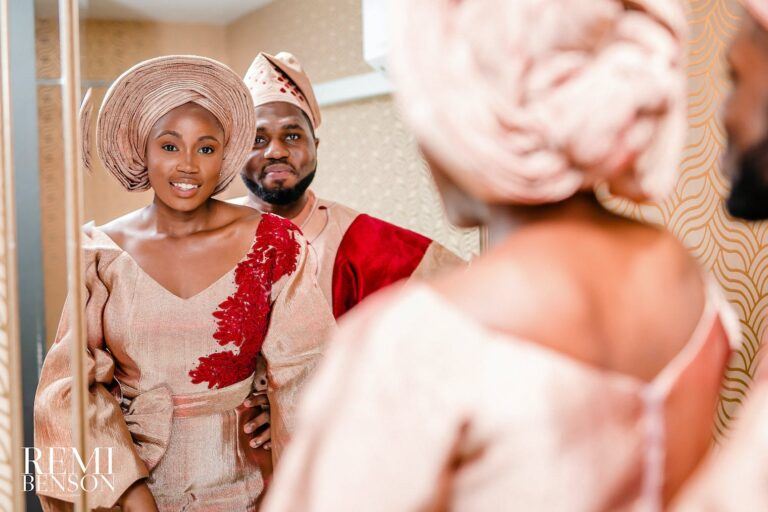
- A dowry is offered by the groom to the bride’s family, which can be a large and expensive gesture, or something smaller and more of a token gift.
- There are often two ceremonies, the first being an introduction known as Kwanjula, and the second similar to Western wedding ceremonies.
- Brides traditionally wear a long silk or cotton dress, known as a gomesi, which is tied around the waist. This may be one of many dresses the bride chooses to wear throughout the course of the day.
- Traditionally, weddings are organised by older members of the family.
- Weddings are big and loud celebrations – so much so, that even strangers are invited to attend.
- Grooms wear a tunic or kanzu, which is often white or cream and floor-length, along with a round, flat cap called a kofia.
- Guests will frequently wear suuka, which women wear around their waist or shoulders, while men wear a kanzu and jacket.
- At the reception, guests often enter while dancing, at which point the couple will offer them a token gift.
- Traditionally, the Okunabbya omugole ritual must be completed by the groom’s mother, which involves the couple being washed in herb-infused water beneath a tree.
- Traditional Ugandan wedding food and drink include:
- Matooke
- Millet flour
- Rice
- Vegetables
- Beef
- Chicken
- Fish
- Fruit
- Chapati
10 Kenyan wedding traditions
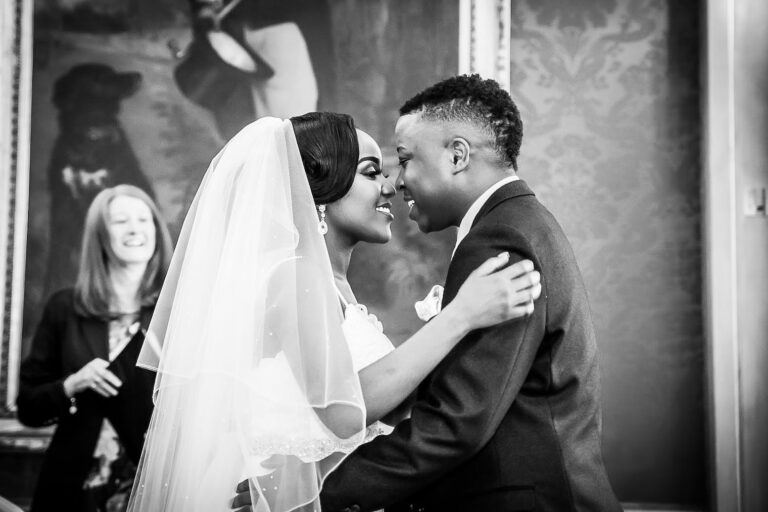
- The bride wears a kanga or kitenge dress, which is a colourful dress with a head wrap. They’ll also wear lots of fabulous jewellery.
- The groom wears a kanzu, a floor-length white tunic, or a suit, with a kofia – a flat, round cap.
- The two families greet each other outside the venue to introduce themselves to one another before entering together.
- A sand-pouring ritual symbolises the two families coming together.
- The couple jump over a broom which is placed on the floor to symbolise sweeping away any bad luck.
- The bride and groom feed each other wine or honey, which represents the sweetness the two have in marriage. They may also wash each other’s feet as a display of humility.
- Benga or Taarab music is often played at the ceremony.
- Guests are usually invited to sing alongside the band, with anyone welcome to take part.
- On top of wedding favours, the couple traditionally give guests additional gifts, such as jewellery.
- Traditionally Kenyan wedding food and drink include:
- Ugali
- Nyama choma
- Matoke
- Pilau
- Chapati
- Goat
- Vegetables
- Fermented milk
- Tea
8 Zimbabwean wedding traditions
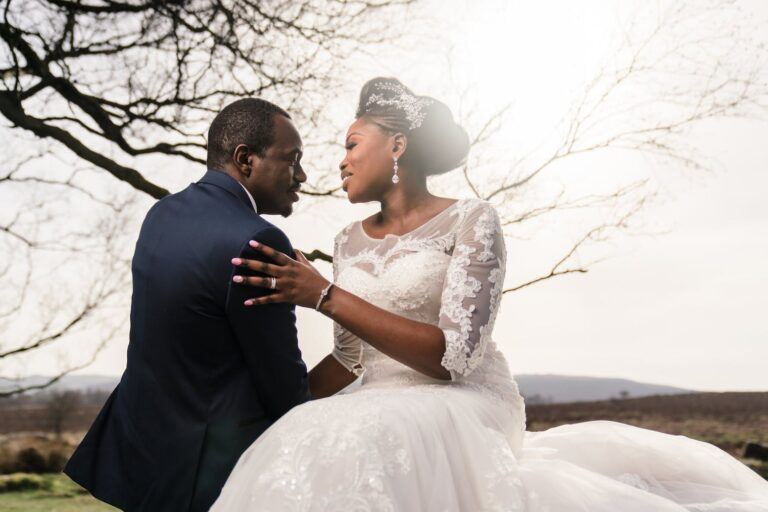
- The bride’s family ask for a dowry known as Lobola, which is traditionally in the form of livestock, but today may be a monetary amount.
- Both families agree on a mediator who will take part in pre-wedding negotiations, who is known as the Munyai.
- Music is played using a Mbira, a traditional Zimbabwean instrument that is thought to summon helpful spirits.
- The home is painted to symbolise that the bride will make a good wife and mother. The bride should paint the gates, walls and interior of the home.
- The bride wears Idzila around her neck, arms and legs, which are rings made of brass and copper, to represent her faithfulness.
- Hoops made from grass called Isigolwani are worn around the neck.
- Traditionally, the bride wears saris or lehengas, while men wear sherwanis or kurta pyjamas.
- Traditional Zimbabwean wedding food and drink include:
- Sadza
- Chicken
- Beef
- Vegetables
- Fruit
- Salad
- Beer
- Wine
8 South African wedding traditions
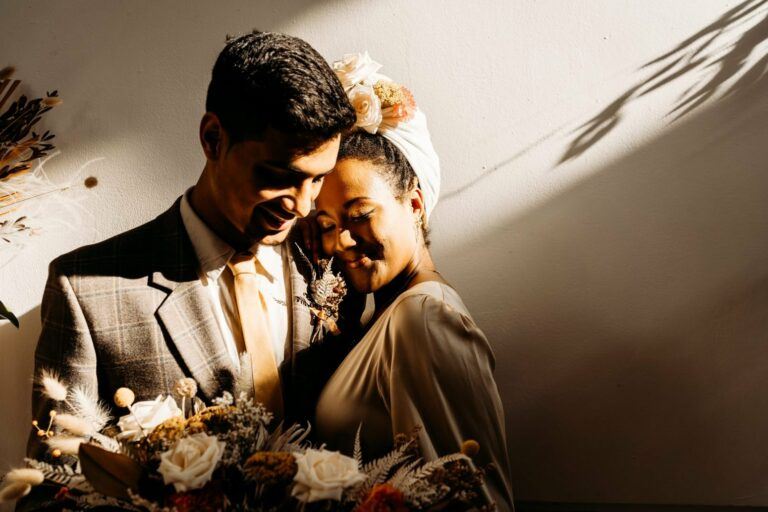
- The Kupe is a traditional wedding dance, where guests stand and dance within a circle.
- Brides may wear a white, full-length dress with a veil or colourful Shweshwe. Grooms may wear a suit or a boubou.
- The Imbeleko ritual involves making an offering to ancestors in the form of exchanging cows.
- The men from the bride’s and groom’s families meet in each others’ homes to talk and drink, which is known as Dherela Amadoda. This is similar to the Umabo Ceremony, which is a traditional Zulu blessing.
- The bride is washed by her mother and other close female relatives in warm water which symbolises washing away bad luck.
- A couple of days before the wedding, the two families come together to share prayer and food.
- Zulu dancing and Marabi music are traditionally included in the celebrations.
- Traditional South African wedding food and drink include:
- Sosaties
- Umphokoqo
- Potjiekos
- Bobotie
- Fruit cakes
- Rakgadi
- Umqombothi
Real Wedding: Charmaine & Chris
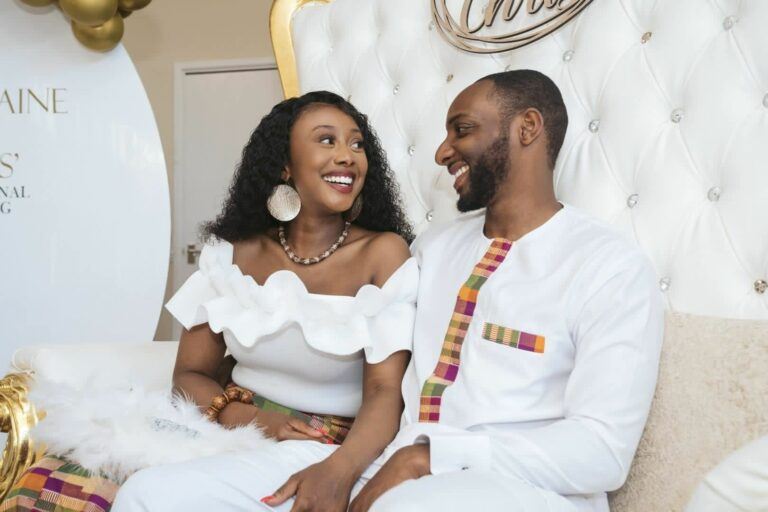
Charmaine and Chris tied the knot on 3 July 2021 at Mitcham Methodist Church and celebrated their love with a beautiful traditional Ghanaian wedding. They followed many of the traditions explained above, most notably:
- The traditional knocking ceremony
- Exchange of gifts from the groom’s family to the bride
- The groom dancing in with his friends and family
- The bride dancing in with her friends and sisters hiding her face until she got to the front
- The bride being asked three times by her father if this was the man she wanted to marry
- The exchange of rings
Real Wedding: Christina & Leslie
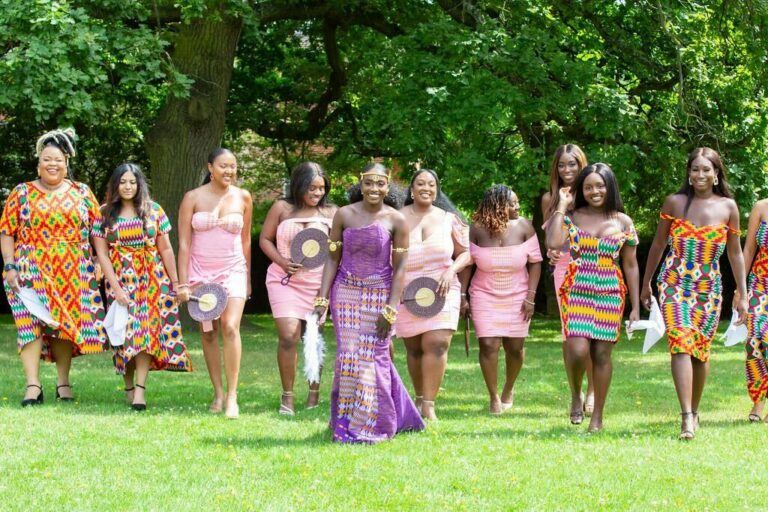
Christina and Leslie tied the knot on 29 July 2023 at Sacred Heart Church in Wimbledon. Christina is Charmaine’s sister, and just like Charmaine, chose to honour her heritage with a traditional Ghanaian wedding, incorporating all the same traditions into her own big day.
Plan your dream wedding with Bridebook
If you’re planning your wedding and looking to honour some of your heritage, there are plenty of ways you can do it, whether big or small. Here at Bridebook, we have all the tools and tips you could need to plan a wedding that’s truly unique and meaningful to you.
